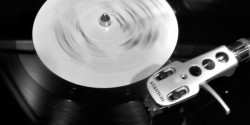As radio lovers, we here at Radio Survivor are also music lovers, as music is an enormous component of so much great grassroots radio. And so much of that music is found on vinyl, whether digging through dusty crates or finding obscure new releases from small labels. While I don’t take a strong position in the vinyl vs. analog debate, my experience is that a nice vinyl LP played on a decent turntable is an enjoyable experience that can be transcendent.
If you’re going to listen to vinyl, or play it on the air, it’s important to have a decent turntable. I find it ironic that the resurgence in interest in vinyl records has also caused the market to be flooded with cheap, plastic turntables that don’t sound particularly good, and also damage your records. It’s all the more ironic when you consider that somewhere someone has purchased a new LP for $20 or $30, but then is slowly destroying it by playing it on a cute, but poorly-built plastic record player that barely cost twice as much.
I last touched on this subject more than five years ago, and believe it or not, there are now even more high-quality, nice-sounding and inexpensive turntables available. More than any time in the last 30 years. That means you aren’t forced to buy a cheap plastic record player just because you can’t spend $500 or more. In fact, I can heartily recommend several turntables that cost as little as $100, and no more than $300. That’s equivalent to just 5 to 10 new LPs.
With the holiday season upon us, a record player may also be on your wish list, or the list of someone you love. So I do want to steer you away from the plastic wonders you’ll find on sale at your local department store or online. They won’t sound very good, they won’t take advantage of vinyl’s strengths, and many of them will actually harm your records.
I’ll even put a finer point on it. Regardless of price, if it were my money I would avoid any record player with the brand name Crosley, Jensen, or Ion, which are the most popular cheap, plastic brands. Furthermore, don’t even bother with any record player with “retro” or “classic” in its name, encased in a olde timey wood cabinet or suitcase, or crammed into a unit along with speakers, a cassette deck and CD player. While there may be a hidden gem within this lot of plastic dreck, these record players are pretty much the same design as the ones in cheap plastic stereos from the 80s, which were partially responsible for giving vinyl a bad name way back then.
Here are my recommendations on reasonably priced turntables for both home use. I have heard all of them, and so can vouch for their quality. This isn’t intended to be a comprehensive list. So if you have others to recommend, please let us know in the comments.
For a variety of reasons I do not recommend these for on-air use, because they do not have the features that radio DJs require, nor are they necessarily designed to stand up to studio-level wear and tear. Note that some of these turntables require something called a phono preamplifier. You’ll find my recommendations on those at the end.
I will follow up this post with one about more pro-level decks that are good for studios.
Paul’s Recommended Budget Turntables:
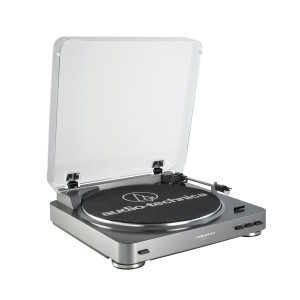 Audio Technica AT-LP60 – Typically around $100
Audio Technica AT-LP60 – Typically around $100
This is the least expensive new turntable that I would recommend. While there’s still a lot of plastic, the tonearm and platter are both metal, and it uses a real decent quality cartridge with an easily replaceable stylus (a/k/a “needle”). It plus into any stereo with an auxiliary input, because it has a phono preamplifier, which is needed to boost the relatively low-level sound of vinyl to something that matches the output of a CD player or iPod. It will be gentle on your vinyl, and even automatically starts and stops playing at the touch of a button. The sound is nice, if not particularly rich and involving, and it does a good job of minimizing clicks, pop and surface noise. Plus, it blows any Crosley playing out of the water.
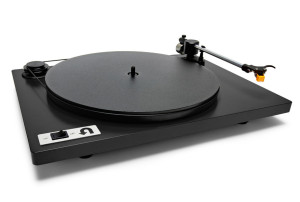 U-Turn Orbit Basic Turntable – $179
U-Turn Orbit Basic Turntable – $179
This turntable was launched with a Kickstarter, and is designed and made in Cambridge, MA. It’s a bare basics turntable, no auto-start or stop, and you have to lift and set the stylus on the record yourself. But the sound is a very clear step above the Audio Technica turntable, or just about any other player in the price range. With the U-Turn and a nice, clean LP you’ll really start to hear what makes some people crazy for vinyl. You’ll need a phono preamp to connect it to your stereo or powered speakers – see my recommendations below.
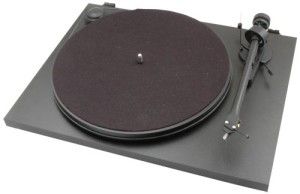 Pro-Ject Elemental Turntable – Typically around $250
Pro-Ject Elemental Turntable – Typically around $250
ProJect Essential II Turntable – Typically around $300
My first truly high fidelity turntable was also the first turntable made by Pro-Ject. About 20 years ago the company started making no-frills turntables that delivered high quality for high value. After 12 years of service (and mine was used) I only just retired it because I finally upgraded. Yet, my old Pro-Ject still soldiers on for a new listener, as it had surprising resale value. That all goes to say that I highly recommend Pro-Ject turntables. Either the Elemental or Essential will really show off your vinyl, and do represent a true step above the U-Turn (as good as it is). They are also simple, with no automation. But this also means they are likely to outlast most other consumer electronics you may own. Like the U-Turn, you’ll need a phono preamplifier.
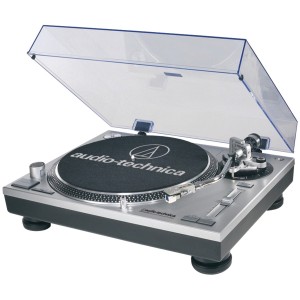 Audio-Technica AT-LP120 – Typically around $250
Audio-Technica AT-LP120 – Typically around $250
Here’s another Audio-Technica, only this one is more a DJ style turntable that I could also recommend for light use in a radio studio. It is also all-manual, and pretty heavy-duty in its construction. While those are plusses, it wouldn’t be my first pick for home use, especially as my only turntable. That’s because I don’t think it quite brings out the finesse and subtly of vinyl the same way as the Pro-Ject and U-Turn turntables. Because vinyl is an all-physical medium, I find that absolute simplicity makes the sound better, and both Audio-Technica turntables have a little more complexity that also muddies the sound a bit by comparison. However, if durability and convenience are more important to you, then I don’t think you can go too far wrong with the AT-LP120. It does have a built-in phono preamplifier, along with USB, though the former is more useful than the latter.
Paul’s Recommended Phono Preamplifiers
If you’re using a stereo that only has a “line in” jack but no inputs labeled “phono” then you will need a phono preamplifier. This is not necessary with the two Audio-Technica turntables I recommended. A phono preamp amplifies the signal and adds a little EQ to make the signal work well with any amplifier. These are my recommendations for under $100
TCC TC–750 – Typically under $50
This is a simple, no frills preamp that sounds better than any other you’ll buy for under $50. Preamps do shape a turntable’s sound, and this one does little harm–much less than any others in this price range.
U-Turn Pluto – $89
If you can spring for the extra $40 then I’d get this preamplifier from U-Turn. It matches the simple, but high-quality design philosophy behind their turntable.
Pro-Ject Phono Box – Typically around $100
This is the same preamplifier I used with my Pro-Ject turntable for a dozen years, and it’s a definite step up from the TCC. I think it works particularly well with Pro-Ject turntables, but wouldn’t hesitate to use it with any player. I can’t really compare it to the U-Turn Pluto. They both sound good, and I haven’t heard them side-by-side.
Have any questions about turntables? Are there turntables that you can recommend? Let us know in the comments:

